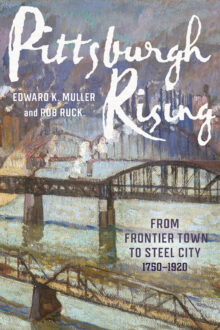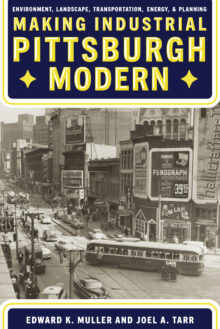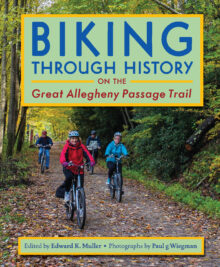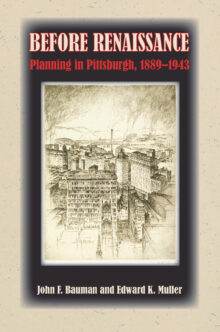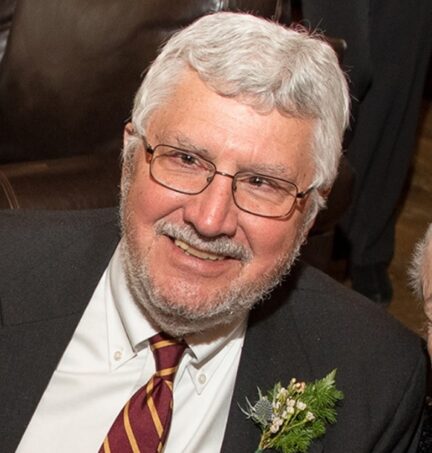
Edward K. Muller
Edward K. Muller is professor emeritus of history at the University of Pittsburgh and former director of the university’s Urban Studies Program. He focuses on the history and geography of North American cities, particularly Pittsburgh. He is coauthor of Making Industrial Pittsburgh: Environment, Landscape, Transportation, Energy, and Planning and Before Renaissance: Planning in Pittsburgh, 1889–1943, among other books, and editor of An Uncommon Passage: Traveling through History on the Great Allegheny Passage Trail and DeVoto’s West: History, Conservation, and the Public Good, among other books.
Pittsburgh Rising
From Frontier Town to Steel City, 1750-1920
Over 170 years, Pittsburgh rose from remote outpost to industrial powerhouse. With the formation of the United States, the frontier town located at the confluence of three rivers grew into the linchpin for trade and migration between established eastern cities and the growing settlements of the Ohio Valley. Resources, geography, innovation, and personalities led to successful glass, iron, and eventually steel operations. As Pittsburgh blossomed into one of the largest cities in the country and became a center of industry, it generated great wealth for industrial and banking leaders. But immigrants and African American migrants, who labored under insecure, poorly paid, and dangerous conditions, did not share in the rewards of growth. Pittsburgh Rising traces the lives of individuals and families who lived and worked in this early industrial city, jammed into unhealthy housing in overcrowded neighborhoods near the mills. Although workers organized labor unions to improve conditions and charitable groups and reform organizations, often helmed by women, mitigated some of the deplorable conditions, authors Muller and Ruck show that divides along class, religious, ethnic, and racial lines weakened the efforts to improve the inequalities of early twentieth-century Pittsburgh—and persist today.
Making Industrial Pittsburgh Modern
Environment, Landscape, Transportation, Energy, and Planning
Pittsburgh’s explosive industrial and population growth between the mid-nineteenth century and the Great Depression required constant attention to city-building. Private, profit-oriented firms, often with government involvement, provided necessary transportation, energy resources, and suitable industrial and residential sites. Meeting these requirements in the region’s challenging hilly topographical and riverine environment resulted in the dramatic reshaping of the natural landscape. At the same time, the Pittsburgh region’s free market, private enterprise emphasis created socio-economic imbalances and badly polluted the air, water, and land. Industrial stagnation, temporarily interrupted by wars, and then followed deindustrialization inspired the formation of powerful public-private partnerships to address the region’s mounting infrastructural, economic, and social problems. The sixteen essays in Making Industrial Pittsburgh Modern examine important aspects of the modernizing efforts to make Pittsburgh and Southwestern Pennsylvania a successful metropolitan region. The city-building experiences continue to influence the region’s economic transformation, spatial structure, and life experience.
Biking through History on the Great Allegheny Passage Trail
Photographs by Paul g Wiegman
The Great Allegheny Passage Trail is a world class biking, hiking, and recreational gateway that stretches nearly 150 miles from Pittsburgh, Pennsylvania, to Cumberland, Maryland, where it connects with the C&O Canal Towpath to reach Washington, DC. Showcasing all the natural beauty of the region, this former Indian path, trade route, military road, railway link, and portion of the original National Road is also a journey through American history. The book’s engaging narrative is complemented by the nature photography of Paul g Wiegman and an extensive selection of historical illustrations, all of which reveal the stunning scenery and history of the biking trail. This book captures the essence of the trail as a journey through both time and space, one that evokes all of the heritage and beauty of a region that would grow to prosper and help forge a nation. Formerly titled An Uncommon Passage: Traveling through History on the Great Allegheny Passage Trail, this is an updated paperback version with a revised introduction and new material that includes the completed trail area in the city of Pittsburgh.
Before Renaissance
Planning in Pittsburgh, 1889-1943
Before Renaissance examines a half-century epoch during which planners, public officials, and civic leaders engaged in a dialogue about the meaning of planning and its application for improving life in Pittsburgh.
Planning emerged from the concerns of progressive reformers and businessmen over the social and physical problems of the city. In the Steel City enlightened planners such as Frederick Law Olmsted, Jr., and Frederick Bigger pioneered the practical approach to reordering the chaotic urban-industrial landscape. In the face of obstacles that included the embedded tradition of privatism, rugged topography, inherited built environment, and chronic political fragmentation, they established a tradition of modern planning in Pittsburgh.
Over the years a m+lange of other distinguished local and national figures joined in the planning dialogue, among them the park founder Edward Bigelow, political bosses Christopher Magee and William Flinn, mayors George Guthrie and William Magee, industrialists Andrew Carnegie and Howard Heinz, financier Richard King Mellon, and planning luminaries Charles Mulford Robinson, Frederick Law Olmsted Jr., Harland Bartholomew, Robert Moses, and Pittsburgh’s Frederick Bigger. The famed alliance of Richard King Mellon and Mayor David Lawrence, which heralded the Renaissance, owed a great debt to Pittsburgh’s prior planning experience.
John Bauman and Edward Muller recount the city’s long tradition of public/private partnerships as an important factor in the pursuit of orderly and stable urban growth. Before Renaissance provides insights into the major themes, benchmarks, successes, and limitations that marked the formative days of urban planning. It defines Pittsburgh’s key role in the vanguard of the national movement and reveals the individuals and processes that impacted the physical shape and form of a city for generations to come.

